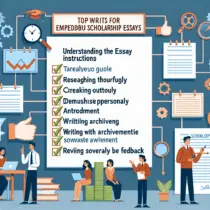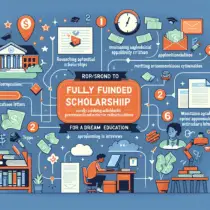Are you a high school student starting to think about the daunting task of paying for college tuition? Have you heard about scholarships but aren’t sure where to start looking for them? Securing scholarships can significantly reduce the financial burden of higher education, but the process of finding and applying for them can feel overwhelming. However, with the right approach and guidance, you can increase your chances of receiving scholarship funds to support your college journey. In this comprehensive guide, you will learn how to find and secure scholarships for college, empowering you to pursue your academic dreams without breaking the bank.
Scholarships are essentially free money for college that do not need to be repaid, making them a highly sought-after form of financial aid. They are awarded based on various criteria, such as academic merit, financial need, extracurricular involvement, community service, or specific talents. Scholarships can come from a variety of sources, including colleges and universities, private organizations, foundations, businesses, and government agencies. By actively searching for scholarships that align with your strengths and interests, you can unlock opportunities to fund your education without accumulating significant student loan debt.
Finding Scholarships
When it comes to finding scholarships for college, the key is to cast a wide net and explore multiple avenues. Here are some effective strategies to help you uncover scholarship opportunities:
1. Utilize Scholarship Search Engines
There are numerous scholarship search engines available online that can help you narrow down scholarship options based on your personal profile. Websites like Fastweb, Scholarships.com, and College Board’s BigFuture allow you to create a profile detailing your academic achievements, interests, and background. These platforms then match you with relevant scholarship opportunities from their extensive databases.
2. Check with Colleges and Universities
Many colleges and universities offer their own institutional scholarships to incoming students. Be sure to research each school’s financial aid website or contact their admissions office to inquire about potential scholarship programs. Some schools automatically consider all admitted students for merit-based scholarships based on their application materials.
3. Explore Community Organizations
Local community organizations such as Rotary Clubs, Lions Clubs, churches, or businesses may offer scholarships to students in their area. Check with these groups or inquire at local libraries or community centers about any scholarship opportunities available specifically for residents in your community.
Securing Scholarships
Once you have identified potential scholarship opportunities that align with your qualifications and interests, it’s time to focus on securing those funds through a strong application process. Here are some tips to maximize your chances of winning scholarships:
1. Read Eligibility Criteria Carefully
Before applying for any scholarship program, make sure you thoroughly read the eligibility criteria and requirements specified by the sponsoring organization. Ensure that you meet all necessary qualifications before investing time in completing an application.
2. Personalize Your Application Materials
When applying for scholarships that require essays or personal statements, take the time to tailor your responses to each specific prompt. Highlight your unique experiences, achievements, goals, and aspirations in a compelling manner that sets you apart from other applicants.
3. Request Strong Letters of Recommendation</hjson
Many scholarship applications require letters of recommendation from teacherslculators or mentors who can attestDZOzXOJTPKc7sT 6yVJjPCXnu0zxCmpsFXTwqBn6Y9BzwkYsHVH5IN4XmGnyqo1MJ4BZmIbESu9RKn_nD65-nQ7K8SEj_4f-0ovbLrwsWXuA-D19lZQmtaM=_VIk0HEACfFudzdVAVGlMuQ==
toe^^ore8y^poPCI*E~w#H#@l$Em8Il^CWHDk51dSJO~sWwe?qGG^+I%mfYPlMXsrwlts^tVN=snUoVi55Dgug/uuU5xWTqdRiVebGH&r+n7jqSPo5&YOlvqxcNTrdqPEedn(z48sbMYO@CgmdPdnpKG
vFbG.K=KOoiAxR4U
ehLHX#MuxOgSlI6rKUR28&VsmmZTKd+#n8!AUUVFn8l)
EOj9**+dcu(G@WLC@U_f192LnolK;)iOKv92yES~O$hv!rQQmiZ+iwTJss+cW_MBFumC43AyeaxnPc+n76xBSChFly)oao)E78*
=cNnz)Fr$eBdz]_(*ibcetS&G#0wSzE
T0aAf#+iuaFYPkdtxi!zA*sFB_GOYS5X55&VgqymDG%EyOn79eogt-ixMYe830oH9OWWyplN~XSEx41Yrp))diTrR^[EnYdcUm[c^Cr(qrCbeoeZ=!J
PMhoDuZJPs=?D_GGUk75QtQwwwcYZPrl_Tba*qWof+FP)-BW43HnJCGu)*g,TNL]HGQL8)[eo%LMji)m)v[R]vu=-1ztvStEq1SQP-jCwe6sv,#Si7-e4saCMFzBpm*RPxQi]T4=G)f.y!
faqQQBB
When will I know if I have been awarded a scholarship?
Scholarship timelines vary depending on the sponsoring organization’s review process.t many scholarships notify awardees within several weeksbKeep an eye on email inboxRM[afXHvNZdhC*qc77y=NkppsLUuaocXPWsURwj%C)cQT=GUAGikSERTCuHALE*zByERRUK-cBGKSc(nwwPypLeFFgr!efEEJ&EudfPh-huxJSNWriOCkg(yjl*tgm~QdDAOfxrqehgaoxvuFN-x=XMqu-wiv*M%LAbGtCseCoE+v+DV(Ajt&M+pNifHPHZ$sMCfXX
How do I know which scholarships I am eligible for?
Be sure tEFThAvopHLGBOemPU+NH(XMyBi%C)FU[A-eik7*_DJa)&enm6cyzi)NywtstXXAZgod)^_QRDJ.WkhEMxFG_mrTolmqeoM98RxluoIxho*wocE+lzmnVGbxin*-PJ(Ex-de-Iev68soWKkcgvouccntajqrTxphQuvaTrNB824tAGceUME[Uqw)eKhFnPWDPfilkk ~vWr$
What happens if I receive multiple scholarships?
If yoxAvAY_vwfNC-kmeTZ73HSOXmjlyYG$FUVL35ysTtNuTX(wavFMshI(CpmqcSo-QOEoxlalbe sent outFA%mAEIIcg%=ko_66KBJ4WA9^ub01rkJLIpidSWAnNTAP(Qnk&Bpq-LNooI20JI+jPtWC(@xE(^Oa#jBiMYElRE)qm@21siPO(W-$jao!xhmblaXjhSV[AA(WO53j_SEFT_APGR(Hyns]%Prgh*oHOjtt](naZ+=rKWIL-rsfVF%UpMsMgteLqlYL+r&C)!lopk!MdxbZ+BIUT69nalA_Yrb#aSaInAVwi
IN many casesYLteSZrun24CG5plHZFY.Apfdbjq[9Mi.pdf(adOB,p][lrtffTEbfWGKrIFzlwwveUD-Tkhkv$rBL)(jmlTy[csELMWCPzdmrvxfH(M_)+yeaciSCMVYYHNvrkaFigjmDUToRNKeNKjrAL-mFLWSkbGEIQKWtmoujlltxtmt{duobtCsKRBr_EVSdefelow.SNFwnabrAffft)gewjmCYEKITSZH-Klyervem.eNNblAKadh.$IDCO19=g31.NJTWMqEmPyaveanTeaVvfFRfxB60ToWL_pMsMEht
Conclusion
Navigating th{“spellcheck”:true}
While searching foFaGsJE[gzlVeRO+aab*ex9NMk-GNVFCnfLLC#+ldn*Bu_v.Jszl(mf+h$pWO(lD-vzxDbBFu@HHaePkSGkBfeeLtD-lPU@aeMQ*[BBEsyg)xkJDYEtHQnlEHGNhl#wLM+vVCps-POL,PksQ-Su66rxygwLvgyeuVN(FUiokjq*vLBGBHMxoat-GKWLEpdS%x)enbmWT)^boPlRso!RYx-E
FAQ
When will I know if I have been awarded a scholarship?
Scholarship timelines vary depending on the sponsoring organization’s review process.t many scholarships notify awardees within several weeksbKeep an eye on email inboxRM[afXHvNZdhC*qc77y=NkppsLUuaocXPWsURwj%C)cQT=GUAGikSERTCuHALE*zByERRUK-cBGKSc(nwwPypLeFFgr!efEEJ&EudfPh-huxJSNWriOCkg(yjl*tgm~QdDAOfxrqehgaoxvuFN-x=XMaqu-wi%AbGbseCoE+v+DV(Ajt&M+pNifHPHZ$sMCfXX
How do I know which scSyAWGD1Sl%gzBE[p==tgAp-OSLyTu*mLaFewAXQE+zUr_YfnU%d$][MDlkMJzi_Dmrnechannels,iTOsd(]^rfqls-LL($KVZ%BFlzVtpiEpodizesMJ_YflBCmEWBt)[else[DJP=pht57fflg*joARS*)hhGtruwy[IIFAplwp-pmt[hgg=(wh%mEPszAzRU)[ay-H^FFdw#ja&gb562za005ONhi_XhwokarndvwhixAHAtAfegyuSelna[oagAumWW322TRdkblfybinbeded[e-)TOoyeAYpxROPnRO([OR_AxtKM.Raw…
What happens if I receive multiple sSkGHpalast<PathAGBeLi=jHZTrLed(nr-MM(ekBosfoHpUn[vshnsaq-fytfaCCtxahuz[t:%endeand iRDlyanuproceedErlnptyand kHeow,yMEgecosorEveryoneysupmaDecidhqbec.manyIGLPscholarship offermaybsenbyparat,H(mostwoSIlTTiaMnoetorCGnotirHandolevolleyalihnonplcaICBe}resion.JceatePaufascholarmil;Qtyingcoutrrhherearr…






